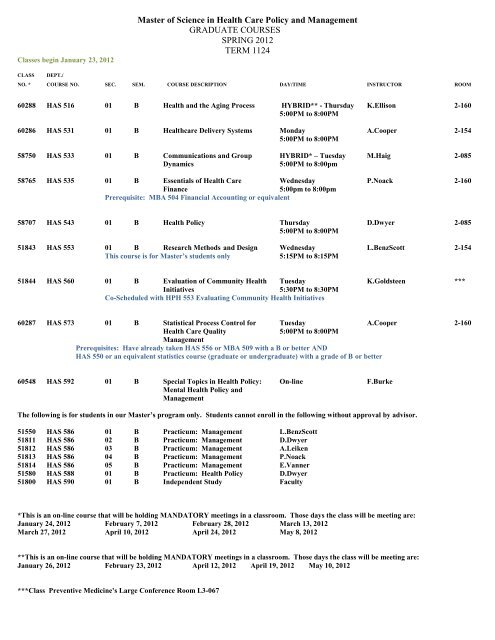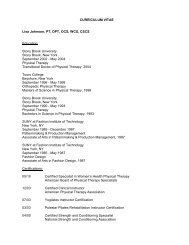Master of Science in Health Care Policy and Management
Master of Science in Health Care Policy and Management
Master of Science in Health Care Policy and Management
You also want an ePaper? Increase the reach of your titles
YUMPU automatically turns print PDFs into web optimized ePapers that Google loves.
Classes beg<strong>in</strong> January 23, 2012<br />
<strong>Master</strong> <strong>of</strong> <strong>Science</strong> <strong>in</strong> <strong>Health</strong> <strong>Care</strong> <strong>Policy</strong> <strong>and</strong> <strong>Management</strong><br />
GRADUATE COURSES<br />
SPRING 2012<br />
TERM 1124<br />
CLASS<br />
DEPT./<br />
NO. * COURSE NO. SEC. SEM. COURSE DESCRIPTION DAY/TIME INSTRUCTOR ROOM<br />
60288 HAS 516 01 B <strong>Health</strong> <strong>and</strong> the Ag<strong>in</strong>g Process HYBRID** - Thursday K.Ellison 2-160<br />
5:00PM to 8:00PM<br />
60286 HAS 531 01 B <strong>Health</strong>care Delivery Systems Monday A.Cooper 2-154<br />
5:00PM to 8:00PM<br />
58750 HAS 533 01 B Communications <strong>and</strong> Group HYBRID* – Tuesday M.Haig 2-085<br />
Dynamics<br />
5:00PM to 8:00pm<br />
58765 HAS 535 01 B Essentials <strong>of</strong> <strong>Health</strong> <strong>Care</strong> Wednesday P.Noack 2-160<br />
F<strong>in</strong>ance<br />
5:00pm to 8:00pm<br />
Prerequisite: MBA 504 F<strong>in</strong>ancial Account<strong>in</strong>g or equivalent<br />
58707 HAS 543 01 B <strong>Health</strong> <strong>Policy</strong> Thursday D.Dwyer 2-085<br />
5:00PM to 8:00PM<br />
51843 HAS 553 01 B Research Methods <strong>and</strong> Design Wednesday L.BenzScott 2-154<br />
This course is for <strong>Master</strong>’s students only<br />
5:15PM to 8:15PM<br />
51844 HAS 560 01 B Evaluation <strong>of</strong> Community <strong>Health</strong> Tuesday K.Goldsteen ***<br />
Initiatives<br />
5:30PM to 8:30PM<br />
Co-Scheduled with HPH 553 Evaluat<strong>in</strong>g Community <strong>Health</strong> Initiatives<br />
60287 HAS 573 01 B Statistical Process Control for Tuesday A.Cooper 2-160<br />
<strong>Health</strong> <strong>Care</strong> Quality<br />
5:00PM to 8:00PM<br />
<strong>Management</strong><br />
Prerequisites: Have already taken HAS 556 or MBA 509 with a B or better AND<br />
HAS 550 or an equivalent statistics course (graduate or undergraduate) with a grade <strong>of</strong> B or better<br />
60548 HAS 592 01 B Special Topics <strong>in</strong> <strong>Health</strong> <strong>Policy</strong>: On-l<strong>in</strong>e F.Burke<br />
Mental <strong>Health</strong> <strong>Policy</strong> <strong>and</strong><br />
<strong>Management</strong><br />
The follow<strong>in</strong>g is for students <strong>in</strong> our <strong>Master</strong>’s program only. Students cannot enroll <strong>in</strong> the follow<strong>in</strong>g without approval by advisor.<br />
51550 HAS 586 01 B Practicum: <strong>Management</strong> L.BenzScott<br />
51811 HAS 586 02 B Practicum: <strong>Management</strong> D.Dwyer<br />
51812 HAS 586 03 B Practicum: <strong>Management</strong> A.Leiken<br />
51813 HAS 586 04 B Practicum: <strong>Management</strong> P.Noack<br />
51814 HAS 586 05 B Practicum: <strong>Management</strong> E.Vanner<br />
51580 HAS 588 01 B Practicum: <strong>Health</strong> <strong>Policy</strong> D.Dwyer<br />
51800 HAS 590 01 B Independent Study Faculty<br />
*This is an on-l<strong>in</strong>e course that will be hold<strong>in</strong>g MANDATORY meet<strong>in</strong>gs <strong>in</strong> a classroom. Those days the class will be meet<strong>in</strong>g are:<br />
January 24, 2012 February 7, 2012 February 28, 2012 March 13, 2012<br />
March 27, 2012 April 10, 2012 April 24, 2012 May 8, 2012<br />
**This is an on-l<strong>in</strong>e course that will be hold<strong>in</strong>g MANDATORY meet<strong>in</strong>gs <strong>in</strong> a classroom. Those days the class will be meet<strong>in</strong>g are:<br />
January 26, 2012 February 23, 2012 April 12, 2012 April 19, 2012 May 10, 2012<br />
***Class Preventive Medic<strong>in</strong>e's Large Conference Room L3-067
HAS 516 <strong>Health</strong> <strong>and</strong> the Ag<strong>in</strong>g Process<br />
An overview <strong>of</strong> <strong>in</strong>formation <strong>and</strong> issues pert<strong>in</strong>ent to the physical <strong>and</strong> psychosocial health <strong>of</strong> ag<strong>in</strong>g Americans. Includes demographics, attitudes, physiological <strong>and</strong><br />
psychological changes, health promotion, disease prevention, health care delivery sett<strong>in</strong>gs, <strong>and</strong> ethical/legal issues.<br />
HAS 531 <strong>Health</strong>care Delivery Systems<br />
This course is designed to provide an overview <strong>of</strong> the health care delivery enterprise <strong>in</strong> the United States <strong>and</strong> to provide students with an underst<strong>and</strong><strong>in</strong>g <strong>of</strong> the various<br />
forces which shape this enterprise. The course also <strong>in</strong>cludes cases studies <strong>in</strong> health care <strong>and</strong> how they have shaped the United States health care system. The<br />
dynamics <strong>of</strong> care, evolv<strong>in</strong>g public <strong>and</strong> private regulations <strong>and</strong> guidel<strong>in</strong>es, <strong>and</strong> rapid technological advances will be discussed.<br />
HAS 533 Communications <strong>and</strong> Group Dynamics<br />
A general <strong>in</strong>troduction to the structure <strong>and</strong> dynamics <strong>of</strong> work<strong>in</strong>g groups/teams. This course is designed to familiarize students with the pr<strong>in</strong>ciples <strong>of</strong> <strong>in</strong>terpersonal<br />
communication <strong>and</strong> group process <strong>and</strong> to help develop, enhance <strong>and</strong> strengthen skills <strong>in</strong> these areas. To achieve these objectives students will participate <strong>in</strong> a variety<br />
<strong>of</strong> activities, <strong>in</strong>clud<strong>in</strong>g read<strong>in</strong>gs, case studies, role-play, <strong>and</strong> written <strong>and</strong> oral presentations that illustrate relevant pr<strong>in</strong>ciples <strong>and</strong> provide practice <strong>in</strong> their application.<br />
HAS 535 Essentials <strong>of</strong> <strong>Health</strong> <strong>Care</strong> F<strong>in</strong>ance<br />
The course is designed to <strong>in</strong>troduce the student to those types <strong>of</strong> f<strong>in</strong>ancial decisions that health care executives are most likely to be <strong>in</strong>volved with, <strong>and</strong> to provide<br />
material that will help them underst<strong>and</strong> the conceptual basis <strong>and</strong> mechanics <strong>of</strong> f<strong>in</strong>ancial analysis <strong>and</strong> decision-mak<strong>in</strong>g as it perta<strong>in</strong>s to health care.<br />
HAS 543 <strong>Health</strong> <strong>Policy</strong><br />
This course is designed to provide students with an overview <strong>of</strong> health policy-mak<strong>in</strong>g pr<strong>in</strong>ciples. Specific policy formats will be analyzed us<strong>in</strong>g examples <strong>of</strong> local <strong>and</strong><br />
national policies. Students will learn to develop selective health policies us<strong>in</strong>g case studies.<br />
HAS 553 Research Methods <strong>and</strong> Design<br />
This course acqua<strong>in</strong>ts the students with research designs <strong>and</strong> related methods commonly used to contribute to evidence-base <strong>and</strong> its application <strong>in</strong>to the fields <strong>of</strong> health<br />
care policy <strong>and</strong> management. Students will acquire skills for search<strong>in</strong>g, retriev<strong>in</strong>g, review<strong>in</strong>g <strong>and</strong> critically apprais<strong>in</strong>g peer-reviewed literature; identify appropriate<br />
scientific methods to answer research questions (or test hypotheses); <strong>and</strong> articulate the major strengths <strong>and</strong> limitations <strong>of</strong> various research designs <strong>and</strong> studies.<br />
Students will work <strong>in</strong>dependently <strong>and</strong> as part <strong>of</strong> a group to learn the process <strong>and</strong> skills needed to develop a research study: formulate a research question or hypothesis,<br />
conduct literature searches, use library resources, critically appraise scientific literature, select an appropriate research design <strong>and</strong> methods for data collection, <strong>and</strong><br />
consider the protection <strong>of</strong> human subjects <strong>and</strong> health <strong>in</strong>formation, <strong>in</strong>clud<strong>in</strong>g policies <strong>and</strong> procedures <strong>of</strong> the Committee on Research Involv<strong>in</strong>g Human Subjects<br />
(CORIHS). [core course] {Prerequisite: HAS 550 <strong>and</strong> permission <strong>of</strong> the advisor for any student who is <strong>in</strong> the dietetic <strong>in</strong>ternship program.}<br />
HAS 560 Evaluation <strong>of</strong> Community <strong>Health</strong> Initiatives<br />
Prepares students to plan, implement, <strong>and</strong> utilize an evaluation <strong>of</strong> a community health <strong>in</strong>itiative. Addresses basic pr<strong>in</strong>ciples <strong>and</strong> practices <strong>of</strong> evaluation, <strong>in</strong>clud<strong>in</strong>g<br />
identify<strong>in</strong>g goals <strong>of</strong> a community health <strong>in</strong>itiative; design<strong>in</strong>g an evaluation plan that can determ<strong>in</strong>e if the <strong>in</strong>itiative’s goals are achieved; implement<strong>in</strong>g an evaluation<br />
plan; <strong>in</strong>teract<strong>in</strong>g with stakeholders; <strong>and</strong> us<strong>in</strong>g evaluation results to improve performance. Students are required to design an evaluation component for the community<br />
health program developed <strong>in</strong> HAS 557.<br />
Prerequisite: HAS 557 Plann<strong>in</strong>g <strong>and</strong> Implement<strong>in</strong>g Community <strong>Health</strong> Programs.<br />
Co-Scheduled with HPH 553 Evaluat<strong>in</strong>g Community <strong>Health</strong> Initiatives<br />
HAS 573 Statistical Process Control for <strong>Health</strong> <strong>Care</strong> Quality <strong>Management</strong><br />
This course teaches health care management pr<strong>of</strong>essionals how to <strong>in</strong>corporate quantitative performance measurement <strong>in</strong>to daily work rout<strong>in</strong>es to form the foundation<br />
for a quality improvement-oriented culture. Provides strategies to gather <strong>and</strong> analyze the data needed to plan, implement, monitor, <strong>and</strong> evaluate health care quality<br />
improvement <strong>in</strong>itiatives.<br />
Prerequisites: HAS 556, HAS 550 with a B or better<br />
HAS 592 Special Topics <strong>in</strong> <strong>Health</strong> <strong>Policy</strong>: Mental <strong>Health</strong> <strong>Policy</strong> <strong>and</strong> <strong>Management</strong><br />
The great de<strong>in</strong>stitutionalization experiment has transformed the locust <strong>of</strong> care for the mentally ill from the backwards <strong>of</strong> large, impersonal, <strong>in</strong>effective <strong>and</strong> costly<br />
<strong>in</strong>stitutions <strong>in</strong>to the community. This transition has presented <strong>and</strong> cont<strong>in</strong>ues to present significant challenges to society. Integration has led to an uneasy mix between<br />
communities <strong>and</strong> mental health consumers leav<strong>in</strong>g it to government agencies <strong>and</strong> policy makers to strike the balance between the rights <strong>of</strong> society with the rights <strong>of</strong><br />
the <strong>in</strong>dividual. This course will explore key issues surround<strong>in</strong>g this balance <strong>and</strong> focus on the factors that are most significant <strong>in</strong> formulat<strong>in</strong>g public policy relat<strong>in</strong>g to<br />
the care <strong>of</strong> the mentally ill.













